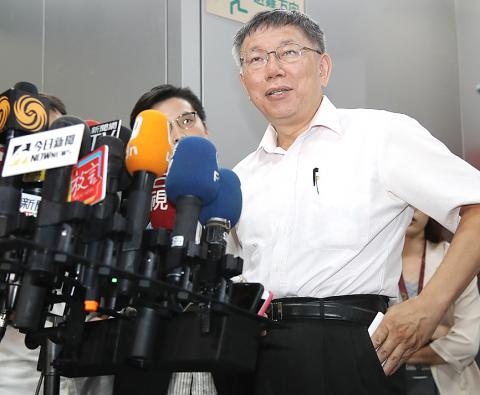Taipei Mayor Ko Wen-je (柯文哲) yesterday said he would not register as an independent candidate in next year’s presidential election, and respects Hon Hai Precision Industry Co founder Terry Gou’s (郭台銘) decision not to run, even though the announcement came as a surprise.
Ko has considered running for a long time, but has always said he would make a decision by yesterday, the Central Election Commission’s deadline to register as an independent candidate.
For the past couple of months, Ko has repeatedly expressed his support for Gou and offered to help him collect petition signatures if he decides to run.

Photo: CNA
“I had originally decided to assist [Gou’s] election campaign, but his decision came too suddenly — I am just as shocked as all of you are,” Ko said.
Gou only informed him about his decision shortly before he announced it to the public, Ko said.
He said he respects Gou’s decision and would not view it as an “assault,” but if Gou had made the decision a month ago, there would have been plenty of time for him to prepare his own bid.
Asked whether Gou had approached him about being his running mate, Ko said that he had long ago rejected the proposal, as he would rather run for president himself and knew it would have been difficult to handle his mayoral duties while running for vice president.
Ko also read a prepared three-page statement responding to Gou’s decision in which he said: “I have never said I would run in next year’s presidential election, but the pan-blue and pan-green camps kept seeing me as an imaginary enemy and putting me in their primary opinion polls.”
“Running for president right after being elected mayor is not a situation that should occur in a normal country, as it would affect municipal administration,” he said, adding that if he could change the political culture in Taipei, it could affect the rest of the nation.
Ko said he was anxious when the presidential candidates of the two major parties were decided, as Taiwan is to get bogged down in a battle between pro-unification and pro-independence ideologies, but what the nation really needs is to improve the efficiency, practicality and performance of its governance.
The election is now to be between the pan-blue and pan-green camps, meaning that it is important for the Taiwan People’s Party (TPP) to win some legislator-at-large seats, so it can become the key minority in the Legislative Yuan, he said.
If the two major parties do not win more than half of the seats in the legislature next year, then TPP legislators could cooperate with both parties to reduce the opposition’s unreasonable opposition and monitor the ruling party’s unscrupulous behavior, Ko said, adding that the TPP would nominate at least 34 candidates for legislator-at-large seats.

Taiwan is stepping up plans to create self-sufficient supply chains for combat drones and increase foreign orders from the US to counter China’s numerical superiority, a defense official said on Saturday. Commenting on condition of anonymity, the official said the nation’s armed forces are in agreement with US Admiral Samuel Paparo’s assessment that Taiwan’s military must be prepared to turn the nation’s waters into a “hellscape” for the Chinese People’s Liberation Army (PLA). Paparo, the commander of the US Indo-Pacific Command, reiterated the concept during a Congressional hearing in Washington on Wednesday. He first coined the term in a security conference last

DEFENSE: The National Security Bureau promised to expand communication and intelligence cooperation with global partners and enhance its strategic analytical skills China has not only increased military exercises and “gray zone” tactics against Taiwan this year, but also continues to recruit military personnel for espionage, the National Security Bureau (NSB) said yesterday in a report to the Legislative Yuan. The bureau submitted the report ahead of NSB Director-General Tsai Ming-yen’s (蔡明彥) appearance before the Foreign and National Defense Committee today. Last year, the Chinese People’s Liberation Army (PLA) conducted “Joint Sword-2024A and B” military exercises targeting Taiwan and carried out 40 combat readiness patrols, the bureau said. In addition, Chinese military aircraft entered Taiwan’s airspace 3,070 times last year, up about

A magnitude 4.3 earthquake struck eastern Taiwan's Hualien County at 8:31am today, according to the Central Weather Administration (CWA). The epicenter of the temblor was located in Hualien County, about 70.3 kilometers south southwest of Hualien County Hall, at a depth of 23.2km, according to the administration. There were no immediate reports of damage resulting from the quake. The earthquake's intensity, which gauges the actual effect of a temblor, was highest in Taitung County, where it measured 3 on Taiwan's 7-tier intensity scale. The quake also measured an intensity of 2 in Hualien and Nantou counties, the CWA said.

The Overseas Community Affairs Council (OCAC) yesterday announced a fundraising campaign to support survivors of the magnitude 7.7 earthquake that struck Myanmar on March 28, with two prayer events scheduled in Taipei and Taichung later this week. “While initial rescue operations have concluded [in Myanmar], many survivors are now facing increasingly difficult living conditions,” OCAC Minister Hsu Chia-ching (徐佳青) told a news conference in Taipei. The fundraising campaign, which runs through May 31, is focused on supporting the reconstruction of damaged overseas compatriot schools, assisting students from Myanmar in Taiwan, and providing essential items, such as drinking water, food and medical supplies,